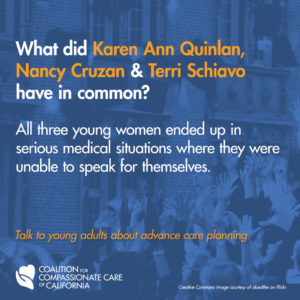When my children became young adults, I talked with them openly about three major court cases that would have been averted had there been an advance directive:
Karen Ann Quinlan,
Nancy Cruzan and
Terri Schiavo. What was remarkable about all three cases is that they were not about people in old age, they were about young women in their 20’s who ended up in serious medical situations where they were unable to speak for themselves. The families of all three women had intense disagreements about their daughter’s health care. Ultimately the judicial system intervened in a very public way in what should have been a private family decision.

With that history in mind, I shouldn’t have been surprised when my 18-year-old asked me to get out of bed and walk her through an advance care plan late at night.
As a young girl, Andrea once attended a community event that honored the donor families and recipients of organs. A few years later, she saw the powerful change in a cousin’s life after he received an organ donation to replace his lungs that were damaged by the ravages of cystic fibrosis. These experiences were on Andrea’s mind when she indicated that she wanted to be an organ and tissue donor in her advance directive.
On the morning of her surgery, Andrea and I had planned to stop at a local notary public on our way to the ambulatory surgery center; however, we received a call asking for us to come in early—her surgery had been moved up due to a cancelation. No notary offices were open in those early hours, so we headed straight for the surgery center.
After checking in, the medical team was ready to prep Andrea for her surgery.
“Mom, I can’t go into surgery until I sign my advance directive,” she said. “If anything happens to me, you know what I would want. I want you to be my decision-maker.”
The admitting clerk suggested we ask two of the parents in the waiting area to witness her signature on the document. They both readily agreed. The document was signed, witnessed, and scanned into her electronic medical record, and back she went for what was, happily, an uneventful surgery with a full recovery.
Christine L. Evans, RN, MSN, is a clinical educator for Dignity Health in Sacramento, California, where she teaches basic life support, neonatal resuscitation, palliative care and POLST. A registered nurse since 1976, Evans has worked in a variety of settings including medical surgical nursing, neonatal intensive care, and as a clinical nurse specialist in a women’s hospital. She is co-developer of the California POLST Education Program and the POLST program for pediatric care teams.